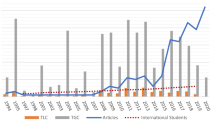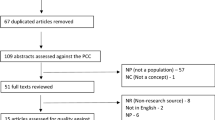Abstract
Introduction/Aims
Training is essential for future health care providers to effectively communicate with limited English proficient (LEP) patients during interpreted encounters. Our aim is to describe an innovative skill-based medical school linguistic competency curriculum and its impact on knowledge and skills.
Setting
At Stanford University School of Medicine, we incorporated a linguistic competency curriculum into a 2-year Practice of Medicine preclinical doctoring course and pediatrics clerkship over three cohorts.
Program Description
First year students participated in extensive interpreter-related training including: a knowledge-based online module, interactive role-play exercises, and didactic skill-building sessions. Students in the pediatrics clerkship participated in interpreted training exercises with facilitated feedback.
Program Evaluation
Knowledge and skills were evaluated in the first and fourth years. First year students’ knowledge scores increased (pre-test = 0.62, post-test = 0.89, P < 0.001), and they demonstrated good skill attainment during an end-year performance assessment. One cohort of students participated in the entire curriculum and maintained performance into the fourth year.
Discussion
Our curriculum increased knowledge and led to skill attainment, each of which showed good durability for a cohort of students evaluated 3 years later. With a growing LEP population, these skills are essential to foster in future health care providers to effectively communicate with LEP patients and reduce health disparities.

Similar content being viewed by others
References
U.S. Census Bureau. Language Use and English-Speaking Ability: 2000. Census 2000 Brief. Available at: (http://www.census.gov/prod/2003pubs/c2kbr-29.pdf) Accessed January 21, 2010.
Title VI of the Civil Rights Act of 1964. 42 U.S.C. 2000d ed; 1964.
Institute of Medicine. Unequal Treatment: Confronting Racial and Ethnic Disparities in Health Care. Washington: National Academies Press; 2001.
Wilson E, Chen AH, Grumbach K, Wang F, Fernandez A. Effects of limited English proficiency and physician language on health care comprehension. J Gen Intern Med. 2005;20(9):800–6.
Ngo-Metzger Q, Sorkin DH, Phillips RS, et al. Providing high-quality care for limited English proficient patients: the importance of language concordance and interpreter use. J Gen Intern Med. 2007;22(Suppl 2):324–30.
Morales LS, Cunningham WE, Brown JA, Liu H, Hays RD. Are Latinos less satisfied with communication by health care providers? J Gen Intern Med. 1999;14(7):409–17.
Hornberger J, Itakura H, Wilson SR. Bridging language and cultural barriers between physicians and patients. Public Health Rep. 1997;112(5):410–7.
Baker DW, Hayes R, Fortier JP. Interpreter use and satisfaction with interpersonal aspects of care for Spanish-speaking patients. Med Care. 1998;36(10):1461–70.
Karliner LS, Perez-Stable EJ, Gildengorin G. language divide. The importance of training in the use of interpreters for outpatient practice. J Gen Intern Med. 2004;19(2):175–83.
Liason Committee on Medical Education. LCME Accreditation Standards. Available at: (http://www.lcme.org/functionslist.htm) Accessed January 21, 2010.
Lie D, Boker J, Crandall SJ, et al. Revising the Tool for Assessing Cultural Competence Training (TACCT) for curriculum evaluation: Findings derived from seven US schools and expert consensus. Med Educ Online. 2008;13(11).
Bischoff A, Perneger TV, Bovier PA, Loutan L, Stalder H. Improving communication between physicians and patients who speak a foreign language. Br J Gen Pract. 2003;53(492):541–6.
Gurman TA, Moran A. Predictors of appropriate use of interpreters: identifying professional development training needs for labor and delivery clinical staff serving Spanish-speaking patients. J Health Care Poor Underserved. 2008;19(4):1303–20.
Dysart-Gale D. Clinicians and medical interpreters: negotiating culturally appropriate care for patients with limited English ability. Fam Community Health. 2007;30(3):237–46.
Kalet AL, Mukherjee D, Felix K, et al. Can a web-based curriculum improve students' knowledge of, and attitudes about, the interpreted medical interview? J Gen Intern Med. 2005;20(10):929–34.
Lie D, Bereknyei S, Kalet A, Braddock C 3rd. Learning outcomes of a web module for teaching interpreter interaction skills to pre-clerkship students. Fam Med. 2009;41(4):234–5.
Makoul G. Essential elements of communication in medical encounters: the Kalamazoo consensus statement. Acad Med. 2001;76(4):390–3.
Lie D, Bereknyei S, Braddock C 3rd, Encinas J, Ahearn S, Boker J. Assessing medical students' skills in working with interpreters during patient encounters: a validation study of the interpreter scale. Acad Med. 2009;84(5):8.
Lie D, Boker J, Bereknyei S, Ahearn S, Fesko C, Lenahan P. Validating measures of third year medical students' use of interpreters by standardized patients and faculty observers. J Gen Intern Med. 2007;22(Suppl 2):336–40.
Grant J, Arnall J, Bereknyei S, et al. Preparing medical students to work with interpreters: successful team training techniques to enhance the effectiveness of standardized patients. Presented at: Western Group on Educational Affairs (WGEA) Regional Conference. Pacific Grove, CA. April 28, 2008.
Acknowledgments
All authors gratefully acknowledge the assistance of Dr. Pree Basaviah, Ms. Madika Bryant, and Ms. Julianne Arnall in the implementation process of this curriculum. The authors also acknowledge funding from the National Institutes of Health (NIH), National Heart, Lung and Blood Institute, award no. K07 HL079330 “Integrated Immersive Approaches to Cultural Competence” (2005-2010) and the Association of American Medical Colleges grant initiative "Enhancing Cultural Competence in Medical Schools" (2005-2008) supported by the California Endowment.
Conflict of Interest
The authors have no conflicts of interest to disclose.
Author information
Authors and Affiliations
Corresponding author
Rights and permissions
About this article
Cite this article
Bereknyei, S., Nevins, A., Schillinger, E. et al. Beyond Knowledge, Toward Linguistic Competency: An Experiential Curriculum. J GEN INTERN MED 25 (Suppl 2), 155–159 (2010). https://doi.org/10.1007/s11606-010-1271-7
Published:
Issue Date:
DOI: https://doi.org/10.1007/s11606-010-1271-7




